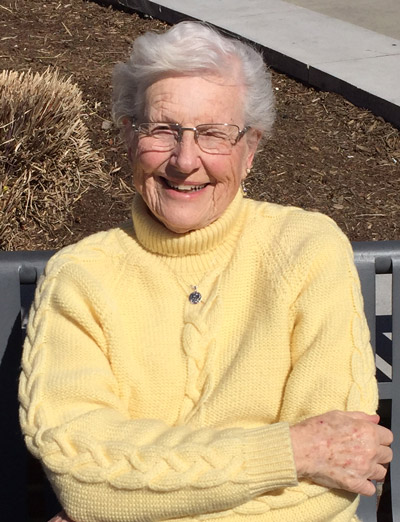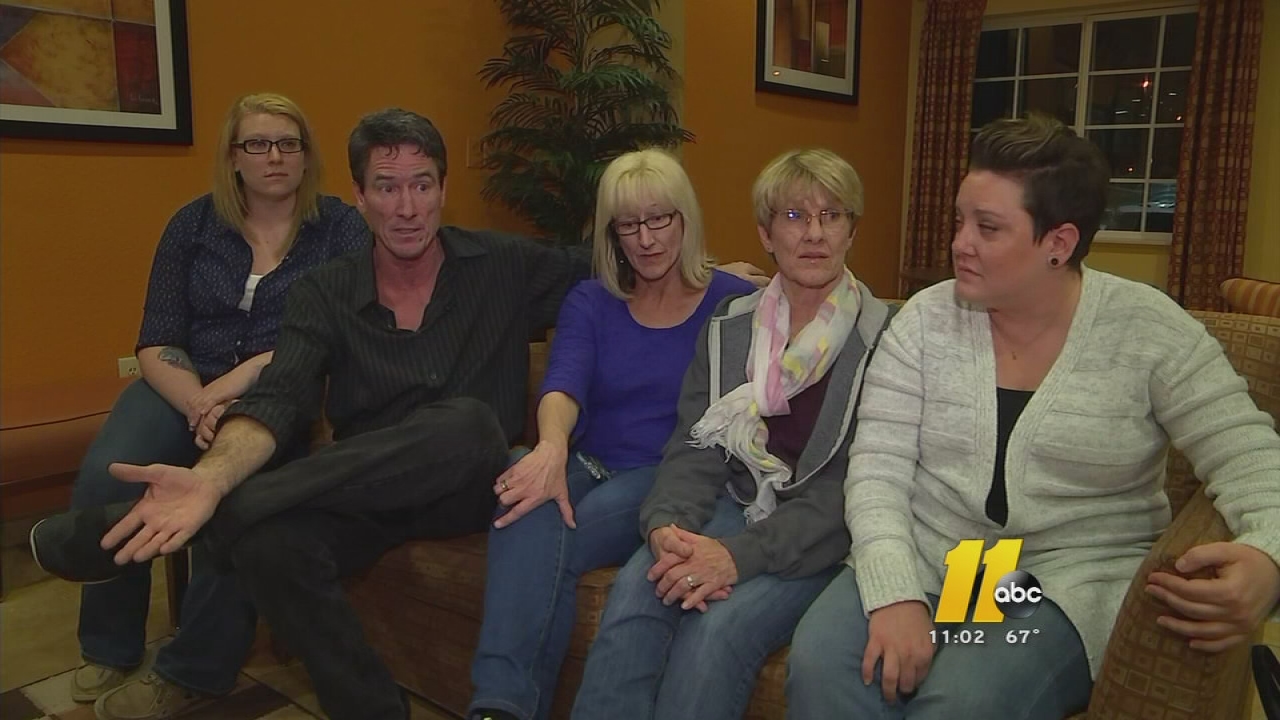Family members of most seriously injured train accident victim want answers
HALIFAX, N.C. (WTVD) -- The family of the most seriously injured victim in Monday's Amtrak crash in Halifax County wants answers.
Mary Kramer, 85, was in Raleigh looking for a new place to live. She was on her way back home to Delaware when the crash happened.
"There's nothing in place to stop this? Just a sign with a phone number, that actually either nobody made that call or somebody made that call and nobody answered that call, which one is it," said Mary's son, Raymond Kramer.
Raymond Kramer is asking the question that no one has answered yet: Did anyone call the number posted at the intersection when a 164-foot-long tractor trailer - with a North Carolina Highway Patrol escort - couldn't get across the tracks?
That number, according to Transportation Secretary Tony Tata could have prevented the Amtrak train from hitting the truck.
"Within a minute, they can contact any traffic on the rail and tell them to stop," said Tata on Monday.
That call could have also prevented Kramer's mother from what he describes as life-threatening injuries.
"She had flown into a table. She was sitting down, and I guess the force of the accident threw her into a table and just gave her such a massive amount of damage," said Raymond.
That damage includes injuries to her liver. She also lost a foot of her intestines and has yet to open her eyes to see her children and grandchildren now rallying around her.
While they wait for answers on her health, the family said it's angry that their mother and grandmother seems to be a victim of a bigger problem.
"When I saw these numbers that came up on how many of these tragedies occurred and how many accidents there have been, who's asleep at the switch looking at these numbers and saying I guess that's acceptable," said Raymond. "Are you kidding me?"
He's talking about stats from the Federal Railroad Administration showing more than 300 injuries and 57 deaths at railroad crossings in the past 10 years in North Carolina. They are numbers that infuriate and upset Kramer and his family who put Mary on the train hoping it would be a safer ride home from North Carolina.
"She's just an incredible woman and it's sad to see her possibly knocked out of the game for something like this," said Raymond. "They need to put something in place that will prevent something like this from happening, it doesn't take a genius to put that all together."
Investigation Under Way
The Federal Railroad Administration continues its investigation into why the northbound Amtrak train slammed into the truck with a 127-ton load. It happened around 12:15 p.m. Monday at N.C. Highway 903 and U.S. Highway 301.
The FRA said it is reviewing an on-board event recorder as well as interviewing the train's crew, the truck driver, and the North Carolina Highway Patrol trooper who was escorting the truck.
The train was removed from the crash scene and taken to a CSX rail yard in Rocky Mount Tuesday. The track - which is owned by CSX - was cleared and reopened.
Also Tuesday, 911 calls reporting the accident were made public.
"They were trying to get a truck across the tracks because it is one that can't make a hard turn and it was stuck and it couldn't move and the 18 wheeler - I mean the Amtrak just hit it. Oh my gosh! Oh my gosh!" said one caller.
Operator: "Were the lights going on the rail on the crossing?"
Caller: "Yeah, they are still going still blinking. I mean he was stuck on the track he could not get the truck off."
The truck was pulling an electrical distribution center that was nearly 16 feet tall and 16 feet wide built by PCX Corporation in Clayton for a customer in New Jersey. The load stretched for 164 feet - longer than half a football field - and required 13 axles to distribute the truck and load's combined weight of 255,000 pounds, a permit shows.
The tractor-trailer followed a back-roads route that included some extremely tight squeezes, including the sharp left turn in Halifax.
A clearly established protocol requires constant contact between a truck driver, the trooper escort, and the train dispatcher when trucks carrying oversized cargo cross tracks, a former federal railroad regulator told the AP.
However, State Highway Patrol spokesman Jeff Gordon said drivers, not troopers, are responsible for warning off trains.
The question now is whether the railroad was contacted about the truck stuck on the tracks.
Protocol calls for troopers escorting trucks to "clear their routes and inform the railroad dispatchers what they're doing," said Steve Ditmeyer, a former Federal Railroad Administration official who teaches railway management at Michigan State University. "Even if they lose contact, they can reach a dispatcher through toll-free numbers that have been posted at these crossings for decades. That dispatcher would have immediately put up a red signal for Amtrak and radioed Amtrak to stop."
In this case, the train engineer "didn't know about the truck until he was coming around a curve. He had no long vision," Ditmeyer said.
The Highway Patrol said the truck spent about five minutes trying to negotiate the railroad crossing. Amber Keeter, who was in her car directly behind the tractor-trailer before impact, said she watched the driver struggle back and forth for about 8 minutes. She originally said it was longer, but then revised her statement.
She told ABC11 that she had asked someone involved if they were seeking help before the crash.
"I asked him, 'can you get anybody on the radio?' He said, 'No, I can't'," Keeter said. "And I asked him, 'are you guys going to be able to stop the train?' He said, 'I don't think so.'"
The number on the sign reaches the CSX Railroad. Callers are asked to press 1 to report an emergency "such as a vehicle on the tracks." CSX spokeswoman Kristin Seay wouldn't say if anyone called before the crash.
Late Tuesday, CSX gave ABC11 a comment on the incident and the investigation: "We cannot comment on the circumstances specific to this collision given that the investigation is ongoing. Standard emergency notification procedures begin when calls are received at CSX's Public Safety Coordination Center. Motorists or others should report a vehicle on the tracks or other rail-related concern to CSX by calling the emergency number on the signs at railroad crossings. The signs also include unique crossing identification numbers that provide the exact location of the crossing. When an emergency call regarding a vehicle or a person on the tracks is received, CSX's public safety communications personnel immediately contact the train dispatcher and trains in the area are directed to stop."
ABC11 has learned there is no requirement that oversized trucks consult railroad timetables before moving across tracks.
Federal officials said they're now focused on how it happened and how to prevent future accidents.
"I will carefully follow the Federal Railroad Administration's investigation and review recommendations on preventing accidents like this from ever happening again," said Congressman G.K. Butterfield in a statement.
There were 213 passengers and eight crew members on the train. Fifty-five passengers were hurt, but most of the injuries were non-life threatening.
The driver of the tractor trailer, John Devin Black, of Claremont, N.C. was not injured. He managed to jump out of the truck before the crash. A background check by the ABC11 I-Team found that Black had his license revoked in the past following two driving charges.
The trucking company, Guy Turner Inc., has a very strong record -- it is in the top 20 percent.
The conductor of the Amtrak train was identified as Keenan Talley, of Raleigh. He told ABC11 by phone Tuesday that he's OK and referred all questions to Amtrak.
A woman who witnessed the crash also took video with her cell phone.
Leslie Cipriani, of Roanoke Rapids, said the tractor-trailer backed up several times as the driver tried to make a left turn. A few minutes later, she heard the sound of the oncoming train and saw the cross bars hit the tractor-trailer. The driver then jumped out of the truck.
The train - the #80 Carolinian - was headed north from Raleigh with an eventual destination of New York with stops in major cities like Philadelphia. The unhurt passengers were taken by bus to Richmond to continue their journey.
The Federal Railroad Administration's database shows at least five previous crashes at the same Halifax crossing, all involving vehicles on the tracks. The most recent was in 2005, when a freight train hit a truck's "utility trailer." In 1977, an Amtrak train hit a car at 70 mph. The driver got out in time, but a railroad employee was injured, that accident report said.
The Associated Press contributed to this report












